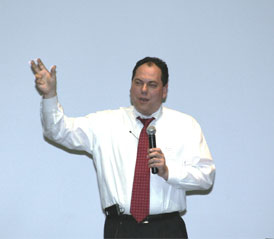U.S. Commerce Official Emphasizes Technology?s Role in Economy
By Anna Lynn Spitzer
Irvine, Calif., August 15, 2006-- The continuous development of technology – especially nanotechnology, biomedical engineering and computer science – will be critical to the U.S. economy in the coming years, said U.S. Under Secretary of Commerce for Technology Robert Cresanti in a speech at Calit2@UCI last week.
|
Cresanti, who also serves as the Commerce Department’s chief privacy officer, visited Orange County as a guest of OCTANe, the Orange County Technology Alliance Network.
In remarks to a standing-room-only crowd of nearly 200 in the Calit2 Auditorium, Cresanti, who was sworn in as under secretary earlier this year, said his department’s charter is to maximize technology’s contribution to economic growth, the creation of high-wage jobs and the social wellbeing of the United States.
“We’re in for a real difficult period of expanded global competition,” he told the audience. “We’re targeted as frontrunners in every single category that the European and Asian communities want to catch up with: manufacturing, nanotech, computer science and biotechnology.”
As the international community pursues specialized niches in manufacturing, software development and electronics, the United States must respond in order to stay competitive. “It’s vital for the U.S. to have a sound strategy to create unique value and jobs in an increasingly competitive global environment,” he stated.
Despite the difficulties, Cresanti remains optimistic.
“With great challenges come great opportunities,” he declared, adding that the current administration’s American Competitiveness Initiative seeks to establish an environment where American innovation can flourish. “The world is changing around us; we have to intelligently and articulately change with it.”
The U.S. is currently in an “innovation-based, knowledge-based” economy that will continue to influence the way business is conducted, Cresanti said. He foresees a time in the near future when all manufacturing will utilize nanotechnology.
Commenting on the waste left by current manufacturing techniques, he said, “You start out with a tree and end up with a toothpick.” By contrast, he said, nanotechnology will offer companies the opportunity to build products atom by atom, with little or no waste.
Funds for federal research and development have increased from $91 billion in 2001 to $132 billion last year, with President Bush determined to increase funding to $137 this fiscal year. Cresanti said the Department of Commerce won a 24 percent increase in funding for labs at the National Institute of Standards and Technology, allowing scientists to advance research in promising fields like quantum information, nanotechnology and hydrogen fuels.
Other steps taken by the current administration to encourage innovation include support for the renewal of the research development tax credit, which encourages private companies to invest in cutting-edge research. “Private innovation is absolutely crucial to our economy, accounting for two-thirds of the total R&D expenditures every year,” Cresanti said. “Making those investments count is a very big challenge.”
In addition, he said a federal change in tech transfer policy will hasten the flow of federally funded R&D to the private sector for commercial development.
While Cresanti and his staff strive to create an environment in which innovation and technology can thrive, he said it’s essential to include the U.S. ’s immigration policy in the equation. “America ’s greatest advantage in the context of a global-oriented economy is our people,” he stated, “and the type of immigration environment we have in this country is very important to that effort.
“We’ve always been the land of opportunity and people around the world want to come here. … We have to be careful to continue to nurture that environment.”
Click here to hear Cresanti's speech


